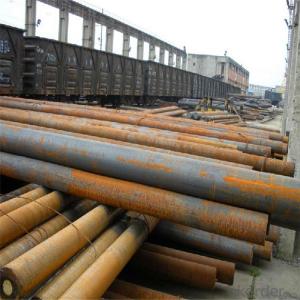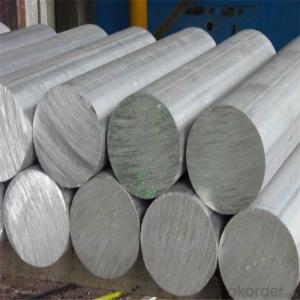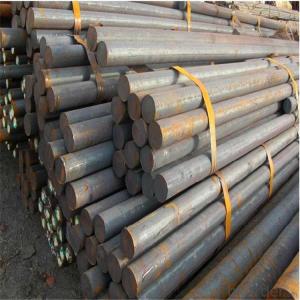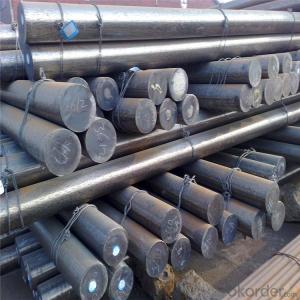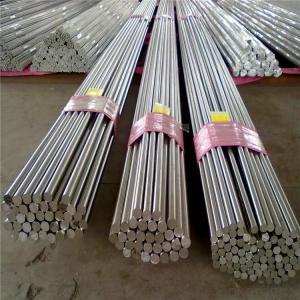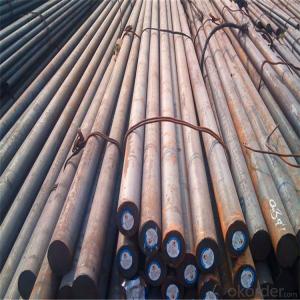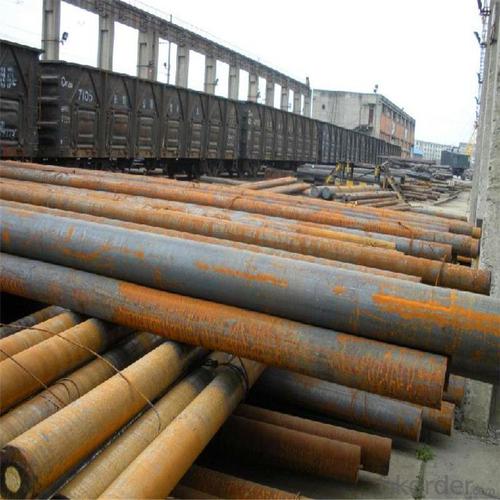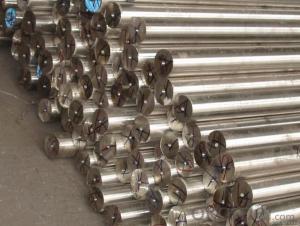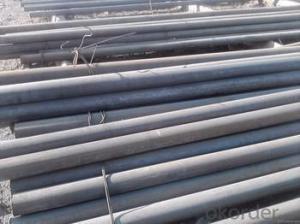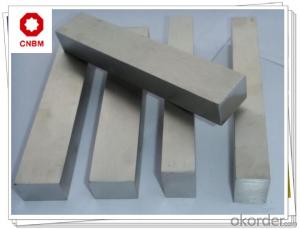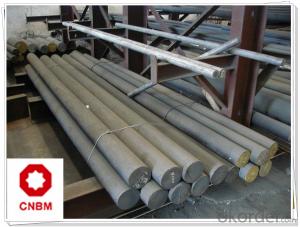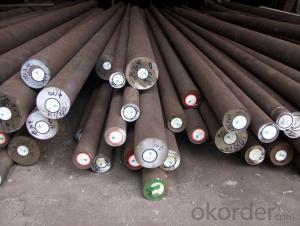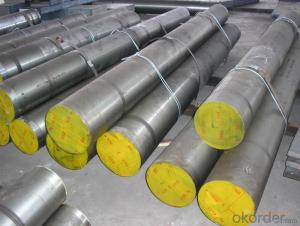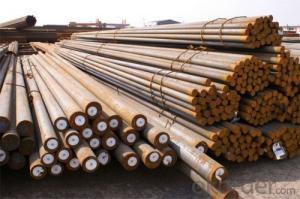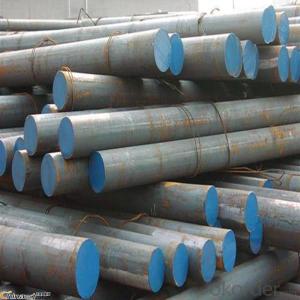S355J2 Steel Round Bar Alloy Steel Round Bar 4140
- Loading Port:
- Tianjin
- Payment Terms:
- TT OR LC
- Min Order Qty:
- 100 m.t.
- Supply Capability:
- 500000 m.t./month
OKorder Service Pledge
OKorder Financial Service
You Might Also Like
Specification
S355J2 Steel Round Bar Alloy Steel Round Bar 4140
Product Description of S355J2 Steel Round Bar Alloy Steel Round Bar 4140
1. Steel grade: ASTM4140, SCM440, 42CrMo, DIN1.7225
2. Length: 6M-12M
3. Diameter: 16mm-300mm
4. Product range: round bar, flat bar, square bar
5. Technique: Hot rolled, forged, cold drawn
Specification of S355J2 Steel Round Bar Alloy Steel Round Bar 4140
Material | SCM4140 | Round bar | Dia(mm) | 16-300mm |
Process | EAF + LF + VD + Forged + Heat Treatment (optional) | Length (mm) | Max 12m | |
Heat treatment | Normalized / Annealed / Quenched / tempered | Flat bar | Thickness(mm) | 8-500mm |
Delivery condition | Hot forged +Rough machined (black surface after Q/T)+ Turned (optional) | Width(mm) | 70-200mm | |
Test | Ultrasonic test according to SEP 1921-84 D/d | Length (mm) | Max 12m |
Chemical Composition of S355J2 Steel Round Bar Alloy Steel Round Bar 4140
C | Si | Mn | Cr | Mo | P | S |
0.38~0.43 | 0.15~0.35 | 0.75~1.00 | 0.8~1.1 | 0.15~0.25 | ≤0.035 | <0.04< td=""> |
Photo Show of S355J2 Steel Round Bar Alloy Steel Round Bar 4140
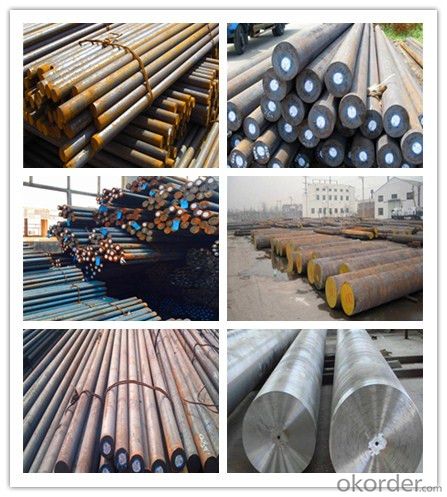
Packing and Delivery:
Packing in bundle package, or as customer's requirements.
Delivery Detail: 45 days after receiving the deposit.
Usage and Applications of S355J2 Steel Round Bar Alloy Steel Round Bar 4140
1. Steel round bar is used in a large number of architectural and engineering structures. Or it can be used in construction of plants for the production of steel house frames, high-voltage transmission towers, bridges, vehicles, boilers, containers, ships, etc.
2. And we can use this kind of product on the performance of the mechanical parts if the demand is not very high.
3. Some special material steel round bar can be used for main shaft of steamer, hummer shank, with big section and supper force.
Company Information
CNBM International Corporation is the most important trading platform of CNBM group.
Whith its advantages, CNBM International are mainly concentrate on Cement, Glass, Iron and Steel, Ceramics industries and devotes herself for supplying high qulity series of refractories as well as technical consultancies and logistics solutions.


F A Q
1, Your advantages?
professional products inquiry, products knowledge train (for agents), smooth goods delivery, excellent customer solution proposale
2, Test & Certificate?
SGS test is available, customer inspection before shipping is welcome, third party inspection is no problem
3, Factory or Trading Company?
CNBM is a trading company but we have so many protocol factories and CNBM works as a trading department of these factories. Also CNBM is the holding company of many factories.
4, Payment Terms?
30% TT as deposit and 70% before delivery.
Irrevocable L/C at sight.
5, Trading Terms?
EXW, FOB, CIF, FFR, CNF
6, After-sale Service?
CNBM provides the services and support you need for every step of our cooperation. We're the business partner you can trust.
For any problem, please kindly contact us at any your convenient time.
We'll reply you in our first priority within 24 hours.
- Q: How are steel round bars used in the construction of high-rise buildings?
- Steel round bars are commonly used in the construction of high-rise buildings as they provide structural support and reinforcement. These bars are used in various applications such as columns, beams, and foundations to enhance the overall strength and stability of the structure. Additionally, steel round bars provide flexibility in design, allowing for efficient load distribution and resistance against external forces such as earthquakes and high winds.
- Q: 40CrMo what is the round steel material?
- Requirements for the manufacture of 35CrMo steel with higher strength and conditioning section large forgings, such as locomotive traction gears, with supercharger drive gear, the rear axle, the connecting rod and the spring load greatly clip, 2000m can also be used for the following deep oil drill pipe joints and fishing tools etc..
- Q: Are steel round bars suitable for decorative purposes?
- Indeed, decorative purposes can be served by steel round bars. Steel, being a versatile and durable material, can be molded and crafted into numerous designs and patterns. The application of steel round bars extends to the creation of decorative elements like railings, furniture, sculptures, and architectural details. The polished and lustrous surface of steel contributes a contemporary and elegant touch to any area. Moreover, the strength and longevity associated with steel make it a pragmatic option for decorative endeavors, as it can endure environmental conditions and preserve its visual appeal throughout time.
- Q: What are the different types of steel round bar surface finishes used in the marine industry?
- In the marine industry, various surface finishes are commonly utilized for steel round bars. These finishes possess distinct characteristics and serve specific purposes, making them suitable for particular applications. The marine industry frequently employs the following steel round bar surface finishes: 1. Polished Finish: To achieve a polished finish, the surface of the steel round bar is ground until it becomes smooth and reflective. This finish is employed when aesthetics are important, as it provides an appealing and shiny appearance. Polished finishes are commonly used for decorative purposes on boat fittings, handrails, and other exposed areas. 2. Mill Finish: Mill finish refers to the surface condition of steel round bars when they are received from the mill without any additional treatment. This finish is characterized by a rough and dull appearance, as it is not intended to be visually pleasing. Mill finishes are typically utilized when a smooth or polished surface is unnecessary, such as in structural applications or when the material will be painted or coated. 3. Shot Blasted Finish: Shot blasting is a surface treatment process that involves propelling small steel shots at high velocity onto the surface of the round bar. This process eliminates surface impurities, scales, or rust, resulting in a clean and slightly textured finish. Shot blasted finishes are commonly used in marine applications where improved adhesion of coatings or paint is required, as the textured surface provides a better bonding surface. 4. Hot Rolled Finish: The hot rolled finish is attained by subjecting the steel round bar to high temperatures during the manufacturing process, followed by rapid cooling. This process creates a scaly surface with a rough texture. Hot rolled finishes are suitable for marine applications where corrosion resistance is not the primary concern and where the material will undergo further processing or coating. 5. Galvanized Finish: Galvanizing involves applying a protective zinc coating to the surface of the steel round bar. This finish offers excellent corrosion resistance, making it ideal for marine applications where the material will be exposed to saltwater or harsh environmental conditions. Galvanized finishes are commonly employed for boat trailers, marine hardware, and other components that require enhanced protection against corrosion. These are merely a few examples of the diverse steel round bar surface finishes used in the marine industry. Each finish possesses its own unique properties and advantages, allowing for a wide range of applications in the maritime sector. The choice of finish depends on factors such as aesthetics, corrosion resistance, coating compatibility, and the specific requirements of the marine application.
- Q: What are the different types of steel round bar profiles?
- There are several different types of steel round bar profiles available in the market. Some of the most common profiles include: 1. Plain Round Bar: This is the most basic and commonly used profile. It is a solid cylindrical bar with a smooth surface and uniform diameter throughout its length. 2. Deformed Round Bar: This type of round bar has deformations or ribs along its surface. These deformations provide better bonding with concrete when used in reinforced concrete structures, making it ideal for construction applications. 3. Hollow Round Bar: As the name suggests, this profile has a hollow center. It is often used in industries where weight reduction is important or where the round bar needs to be used as a conduit for fluids or gases. 4. Threaded Round Bar: This profile has threads along its length, allowing it to be easily screwed into other components. It is commonly used in applications where secure fastening or adjustability is required. 5. Half-Round Bar: This profile has a flat side and a rounded side, giving it a semi-circular shape. It is often used in decorative applications, such as handrails, where a sleek and aesthetically pleasing appearance is desired. 6. Square Bar: Although not strictly a round profile, square bars are often included in this category. These bars have four equal sides and are commonly used in applications where higher torsional strength is required. 7. Hexagonal Bar: Similar to square bars, hexagonal bars have six equal sides. They are often used in applications where high torque resistance is needed or when a distinctive appearance is desired. These are just some of the different types of steel round bar profiles available. The choice of profile depends on the specific application requirements, such as structural strength, bonding capabilities, or aesthetic considerations.
- Q: What are the different surface roughness options for steel round bars?
- There are several different surface roughness options available for steel round bars. These options are typically determined by the manufacturing process and the desired end-use of the steel bars. 1. Hot Rolled: Hot rolled steel round bars have a rough and scaled surface finish. This is due to the high temperature at which the bars are formed, which causes the surface to oxidize and form a layer of scale. This roughness can vary depending on the specific manufacturing process. 2. Cold Drawn: Cold drawn steel round bars are processed at room temperature, resulting in a smoother surface finish compared to hot rolled bars. The cold drawing process involves pulling the steel bars through a die to reduce their diameter, resulting in a more uniform and consistent surface roughness. 3. Peeled and Polished: Peeled and polished steel round bars undergo a secondary process to remove the outer layer of scale or surface defects. This process typically involves peeling the outer layer and then polishing the surface to achieve a smoother and more refined finish. This option provides a high-quality surface with minimal imperfections. 4. Ground: Ground steel round bars are processed through a grinding machine to achieve a precise and smooth surface finish. This process removes any surface defects and irregularities, resulting in a consistent and uniform surface roughness. Ground bars are often used in applications where dimensional accuracy and a smooth surface are required. 5. Turned and Polished: Turned and polished steel round bars are processed on a lathe machine, where the outer layer is removed by turning the bars against a cutting tool. This process results in a smooth and polished surface finish. Turned and polished bars are commonly used in applications where aesthetics and a high-quality surface finish are important. Overall, the choice of surface roughness option for steel round bars depends on the specific requirements of the application. Factors such as dimensional accuracy, surface finish, and aesthetics play a role in determining the most suitable option for a given use case.
- Q: Can steel round bars be used as axles or shafts?
- Yes, steel round bars can be used as axles or shafts. Steel is a commonly used material for axles and shafts due to its high strength and durability. Steel round bars are particularly suitable for applications requiring rotational motion, such as axles and shafts, as they can handle heavy loads and withstand bending and torsional forces. Additionally, steel round bars can be machined and heat-treated to meet specific requirements for hardness and surface finish, further enhancing their suitability as axles or shafts. Overall, steel round bars are a reliable and widely used choice for axles and shafts in various industries, including automotive, machinery, and construction.
- Q: What are the different tolerances for steel round bars?
- The different tolerances for steel round bars depend on various factors such as the diameter, length, and intended application. Common tolerances for steel round bars include diameter tolerances ranging from +/- 0.005 inches to +/- 0.030 inches, length tolerances ranging from +/- 0.125 inches to +/- 0.500 inches, and straightness tolerances ranging from 0.0125 inches per foot to 0.030 inches per foot. However, specific tolerances may vary depending on the specific requirements set by the industry or customer.
- Q: Can steel round bars be used for making control arms?
- Yes, steel round bars can be used for making control arms. They are commonly used in the automotive industry as they provide strength, durability, and stability required for control arm applications.
- Q: Can steel round bars be used for making body panels?
- Indeed, body panels can be crafted using steel round bars. Steel is widely employed in the automotive sector owing to its robustness, endurance, and malleability. By manipulating, joining, and molding round bars, an array of body panel shapes can be achieved, rendering structural reinforcement and safeguarding. Nevertheless, it is crucial to acknowledge that steel round bars may not be the optimal selection for all body panels, as they might possess greater weight when compared to alternative materials like aluminum or carbon fiber. The determination to utilize steel round bars for body panels rests upon factors like the precise vehicle application, desired reduction in weight, and cost considerations.
Send your message to us
S355J2 Steel Round Bar Alloy Steel Round Bar 4140
- Loading Port:
- Tianjin
- Payment Terms:
- TT OR LC
- Min Order Qty:
- 100 m.t.
- Supply Capability:
- 500000 m.t./month
OKorder Service Pledge
OKorder Financial Service
Similar products
Hot products
Hot Searches
Related keywords
